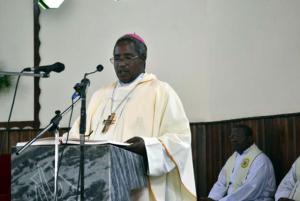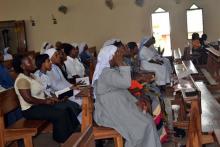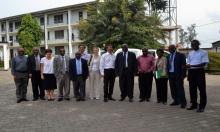The Tanzania Catholic Church launches the Test and Treat Project
On 11th February 2014, the Catholic Church in Tanzania launched the Test and Treat Project which will be implemented in Bugisi District in Shinyanga Region. The occasion which was a Catholic Holy Mass, was held at premises of the Catholic Church Headquarters in Tanzania and led by the Archbishop of Mwanza, Jude Thaddaeus Ruwa’ichi.
Others present at the holy mass included: Monsignor Jean-Marie Mpendawatu from Vatican Health Secretariat, Priests of Tanzania Catholic Church, Supporting Partners including (CUAMM, Bill N’ Gilead Sciences), the WHO Representative, Dr. Rufaro Chatora, WHO staff, representatives from Bugando Hospital, Christian Social Services Commission (CSSC) and the project area of Bugisi in Shinyanga Region.
During the mass, the Archbishop explained that the launch coincided with the Day of The Sick which is commemorated each year by the Catholic Church on the 11th February. He went on to describe how the project will be implemented through partnership between the Catholic Church and the Government of Tanzania with financial and technical support from Bill N’ Gilead (US) and CUAMM (Italy) respectively. The Bishop used the opportunity to emphasize on the role of the church in taking care of spiritual and physical wellbeing of people. He further elaborated on the need for combining prevention and treatment of HIV and the urgency to end discrimination against People Living With HIV (PLHIV). He concluded by expressing appreciation to the World Health Organization for its participation and requested for continued collaboration.
A number of individuals and institutions have advocated for the ‘Test and Treat’ approach for the control of HIV/AIDS. The approach aims to aggressively testing people for HIV and immediately putting those who test positive on antiretroviral treatment (ART) regardless of their CD4 levels or clinical stage. The theory behind this is not only that ART reduces the risk of transmitting HIV by lowering the viral load but also that earlier initiation of ART leads to better health outcomes for the patient.
However, there are a number of unanswered questions around the feasibility of scaling up the approach on a larger scale especially in resource-constrained countries. Such questions include scarcity of resources, readiness of health systems and ensuring compliance of patients to this lifelong treatment. More operations research including ‘demonstration projects’ is therefore needed to answer such questions.
The Representative of Bill N’ Gilead and Monsignor Mpendawatu, further explained how the project was conceived and about consultations held with WHO Regional Office for Africa on the Project.
The WHO Representative, Dr. Rufaro Chatora, thanked the Archbishop and the Catholic Church for inviting WHO to participate at the launch of the project. He explained that WHO at regional and country level appreciated the significance of the project and assured commitment to provide technical support for the Project.
The Project presents a unique opportunity to contribute to policy and programmatic guidance for scale-up of the test and treat initiative in Tanzania and in other resource-constrained countries. WHO Country Office to consider participating at the launch of the Project in Shinyanga as well as supporting proper documentation of the process and lessons from the project.






